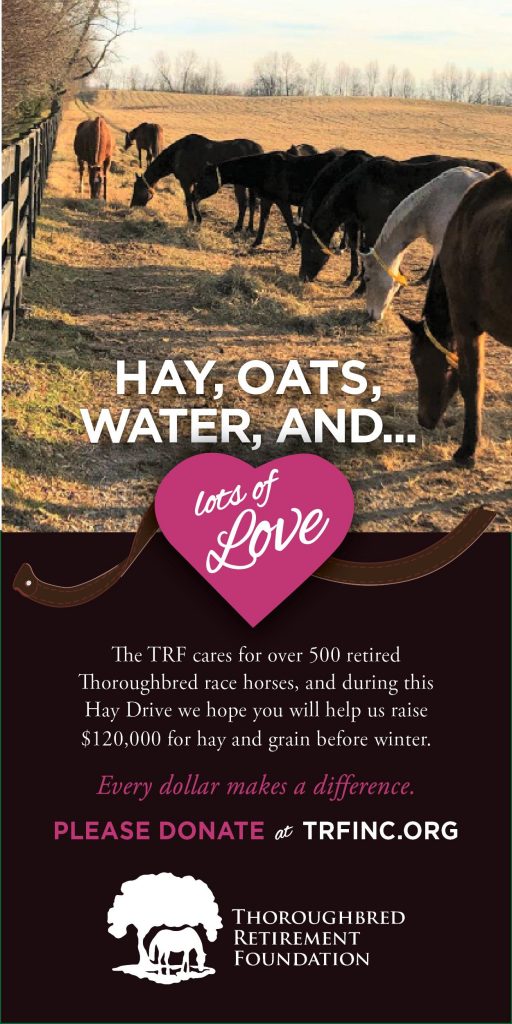
John Evans, the Equine Program Director for the Thoroughbred Retirement Foundation’s Second Chances Program at the Lowell Correctional Institution (LCI) in Ocala, Florida, was having a hard time hearing the person on the other end of the phone.
So, he turned to one of the Second Chances students/inmates and asked for help.
“Will you please take this baby turkey out of here?”
With that, the student came into Evan’s office and removed the source of the “fowl” language.
Evans then returned to his conversation, which centered on the upcoming 20th anniversary of Lowell’s Second Chances program. Evans also has his own anniversary to celebrate this year. This October will mark his 16th year at Lowell.
“Originally, I was hired to take care of the TRF herd horses,” said Evans, once the turkey noises ceased. Evans came to the program with a long resume — he’d worked as a trainer, racetrack steward and farm manager for Arthur Appleton’s Bridlewood Farm near Ocala as well as Stoneway Farm in LaGrange, Kentucky. “At that time, Second Chances was offered just for men. I saw what was going on, and since they were building a women’s facility across the street, I thought that they should change the program to make it just for women.”
Evans paused again for more help in vacating his office of new invaders.
“I’m sorry, we’ve got baby turkeys, chickens and ducks all around here,” he said. “It starts when someone gives us some, and we raise them, and we give them away. The women take good care of them, just like they take care of the horses and everything around here. It keeps them busy. Keeping them busy makes a difference.”
Making a difference is what best describes Lowell’s Second Chances Program. Evans estimates that, since its inception in 2001, approximately 200 women have graduated from the program.
“This program has made a lot of big changes in their lives,” Evans said. “We have a very low recidivism rate. About 60 percent of the women here have children on the outside and they miss them a lot. That’s tough on them. But when they are in this program, they know they are working toward something and to getting back to their families. They take a lot of pride in caring for the animals and the whole place. When they leave here, they understand responsibility and what it means to work together.”
They also know that Evans looks out for them.
In February, the TRF launched its new Second Chances Youth Program at the Center for Success and Independence (CSI) adjacent to LIC. The women from Lowell have no contact with the youth, but they maintain the grounds and bring the horses over and back for the lessons. They even built the barn.
“I have a great situation in that I will have about 15 women here at a time,” Evans said. “They work from 7 a.m-2:30 p.m. I’ll have half in the classroom and half taking care of the horses. They take a lot of pride in what they do, especially with the Youth Program. They take their work seriously. They pretty much take care of the mowing and the weeding. On top of that, they are re-building and painting. Right now, they are painting about eight miles of double fencing. They do whatever it takes.”
Evans is quick to point out that the horses deserve credit for the continuing success of Second Chances. There are now 50 horses in the herd, pending the adoption of one to the St. Augustine Sheriff’s Department. Evans has also been blessed with classy former racehorses that made his job easier over the years, he said.
Carterista, who passed away at the age of 30 in 2019, was the first horse to join the Lowell Second Chances Program. He was a fan favorite and came to Lowell upon his retirement after an eight-year, 102-race career. Then there was Val’s Prince, a two-time winner of Belmont Park’s Turf Classic and the first American horse to win the Hong Kong International, which he did at Sha Tin Racecourse in 1997. He died in 2007.
Lowell’s current roster is star-studded.
There’s Forbidden Apple, winner of the 2001 Grade 1 Manhattan Handicap at Belmont Park and a Florida champion; Shake You Down, a multiple stakes winner who ran a troubled third in the 2003 Breeders’ Cup Sprint at Santa Anita; Hemingway’s Key, who ran third in the 2006 Preakness at Pimlico and third later that year in the Jim Dandy at Saratoga Race Course; and 10-year-old East Hall, who earned more than $800,000.
“I broke Forbidden Apple at Bridlewood and trained him before (Christophe) Clement took over,” Evans said. “He’s still doing great. He doesn’t look much different than when he won the Manhattan. He’s even been my saddle horse. Shake You Down is also a good saddle horse. East Hall is another nice horse; he won the Indiana Derby (at Indiana Grand), the Ohio Derby (at Thistledown) and he won (the Millions Classic Preview Stakes, 2014) at Gulfstream West.
“After their course work, the women can learn to ride if they want to learn. Hemingway’s Key is probably the horse that the women like to ride the most. He had his knee operation, and there is calcification there, but it doesn’t bother him, and he won’t run off with anybody. He’s a good beginner’s horse and a good teacher. And he likes what he’s doing.”
Evans remains the teacher who has made the most impact. Velvet Saulsberry, the Second Chances Youth Program Equine Instructor, has come to rely on Evans’ counsel, his experience and his “wellspring of knowledge.”
“The man has the patience of Job,” she said. “I don’t know what I would do without him – and I have no intention of finding out.”
TRF’s Executive Director, Pat Stickney said John has been “extremely important” to the Second Chances Program. He brings “an incredible work ethic and dedication to helping the women improve their lives while helping our horses,” she said. “We are very fortunate to have John on our team.”
By Francis LaBelle
Photo: John Evans- pictured center right (Courtesy of TRF)




